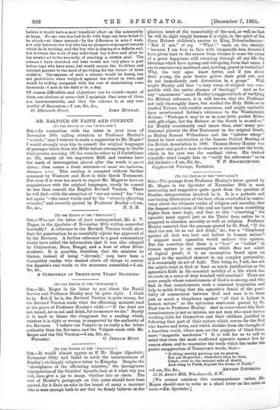ITO THE EDITOR OF THE "SPECTATOR.1
Sin,—The passage from Professor Huxley's letter quoted by M.r. Magee in the Spectator of November 30th is most' interesting and suggestive 'quite apart from the question of Pauline interpretation involved in it. It is a pathetic and convincing illustration of the fact, often overlooked in centre; versy about the ultimate truths of religion and morality, that' the deepest convictions of the soul are based upon something higher than mere logic, and that to this " something " the agnostic must appeal 'just as the Theist does, unless he is prepared to abandon morality as well as religion. Professor Huxley asierted that the passage quoted by St. Paul, "If the dead rise not, let us eat and drink," &c., was a "blasphemy against all that was best and holiest in human nature, I suppose most minorities would endorse this opinion. But the assertion that there is a " best " or " holiest " in human nature is an assumption which does not admit of logical proof; it is an assumption based upon an' appeal to the mystical element in our complex personality, it is essentially an act of faith. This being so, I ask, has not the saint's treat in God at least as much justification as the agnostic's faith in the essential nobility of a life which has its roots in a sense of duty touched with emotion? There are some people vrihose consciousness of God is so strong, and who find in that consciousness such a constant inspiration and help to noble living, that the agnostic's denial of the possi- bility of communion between God and man is to them just as much a blasphemy against "all that is holiest in human nature" as the epicurean sentiment quoted by St. Paul was to Professor Huxley. And in cases where this God- consciousness is not so intense, are not men who must have a working, faith for themselves and their children justified in following that part of their nature which Craves for the God who knows and Lilies, and which shrinks from the thought of a heartless world, where men are the puppets of blind force, mere "magnetic mockeries " ? It is well for ue te call to mind that even the most confirmed agnostic cannot live by reason alone, and to remember the truth which lies under the poetic exaggeration of Tennyson's words, that— "Nothing worthy proving can be proven, Nor yet disproven ; wherefore thou be wise, Cleave ever to the sunnier side of doubt, And cling to Faith, beyond the forms of Faith."
35 St. Anne's Hill, Wandsworth, S. IF', [We cannot continue this correspondence PrileRs Magee should care to write us a 01194 letter raa the point at issue,—ED, Spectatm]






























































 Previous page
Previous page